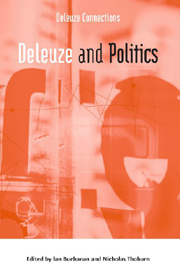Book contents
- Frontmatter
- Contents
- Dedication
- Acknowledgements
- Introduction: Deleuze and Politics
- 1 Power, Theory and Praxis
- 2 Deleuze and the Political Ontology of ‘The Friend’ (philos)
- 3 Molecular Revolutions: The Paradox of Politics in the Work of Gilles Deleuze
- 4 Schizoanalysis, Nomadology, Fascism
- 5 What is a Militant?
- 6 Bourgeois Thermodynamics
- 7 The Age of Cynicism: Deleuze and Guattari on the Production of Subjectivity in Capitalism
- 8 Deleuze, Materialism and Politics
- 9 Becoming-Democratic
- 10 Theorising European Ethnic Politics with Deleuze and Guattari
- 11 People and Fabulation
- 12 Micropolitical Associations
- Notes on Contributors
- Index
9 - Becoming-Democratic
Published online by Cambridge University Press: 12 September 2012
- Frontmatter
- Contents
- Dedication
- Acknowledgements
- Introduction: Deleuze and Politics
- 1 Power, Theory and Praxis
- 2 Deleuze and the Political Ontology of ‘The Friend’ (philos)
- 3 Molecular Revolutions: The Paradox of Politics in the Work of Gilles Deleuze
- 4 Schizoanalysis, Nomadology, Fascism
- 5 What is a Militant?
- 6 Bourgeois Thermodynamics
- 7 The Age of Cynicism: Deleuze and Guattari on the Production of Subjectivity in Capitalism
- 8 Deleuze, Materialism and Politics
- 9 Becoming-Democratic
- 10 Theorising European Ethnic Politics with Deleuze and Guattari
- 11 People and Fabulation
- 12 Micropolitical Associations
- Notes on Contributors
- Index
Summary
Deleuze often refers to his work with Guattari as philosophy and sometimes even as political philosophy. Yet the normative questions about the justification, nature and limits of political power that have preoccupied canonical figures in the history of political philosophy are largely absent from their collaborative writings. They only discuss the institutional forms of political power in passing and always from the perspective of a global theory of society founded upon concepts of desire, machinic processes and forms of assemblage. They are less interested in the justification or the capture of State power than in the qualitative changes in individual and collective identity that occur alongside or beneath the public political domain. Against the background of their commitment to social theory and their preference for minoritarian movements defined in opposition to majoritarian forms of social control, it is surprising to find the concept of ‘becoming-democratic’ included alongside ‘becoming-revolutionary’ as one form of contemporary resistance to the present (Deleuze and Guattari 1994: 113). In effect, as I will argue, the appearance of ‘becoming-democratic’ in What Is Philosophy? represents a new turn in Deleuze and Guattari's political thought. It renders explicit the reliance upon some of the political values that inform democratic constitutional politics that was implicit in their earlier work. As such, it does not imply any fundamental rupture in their approach to philosophy or to politics. The first two sections of this paper will argue for this diagnosis via an examination of their concepts of philosophy and the political.
- Type
- Chapter
- Information
- Deleuze and Politics , pp. 178 - 195Publisher: Edinburgh University PressPrint publication year: 2008



